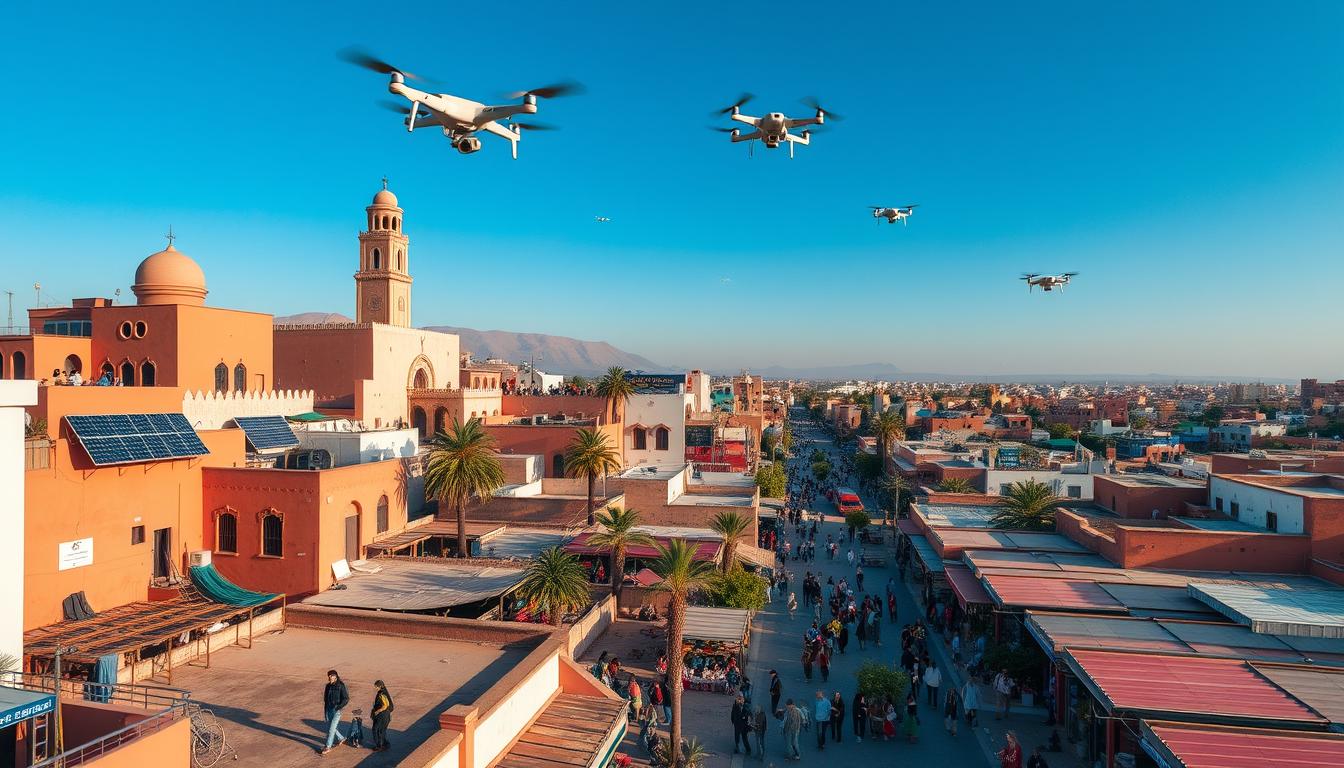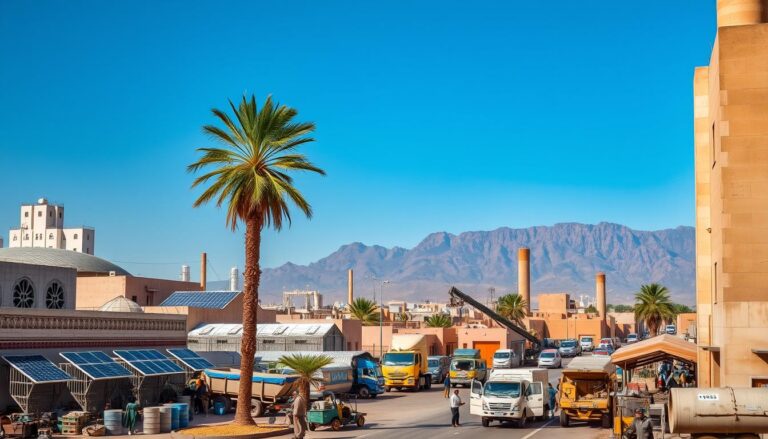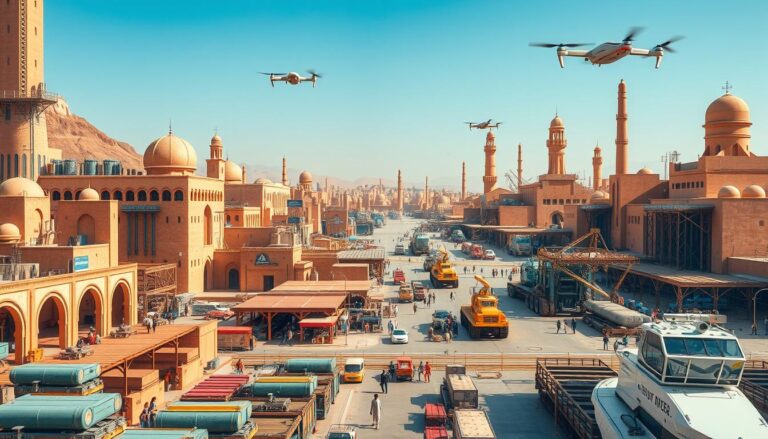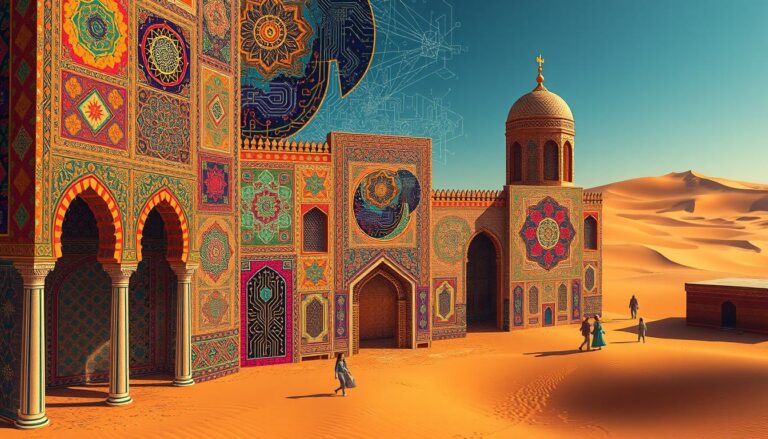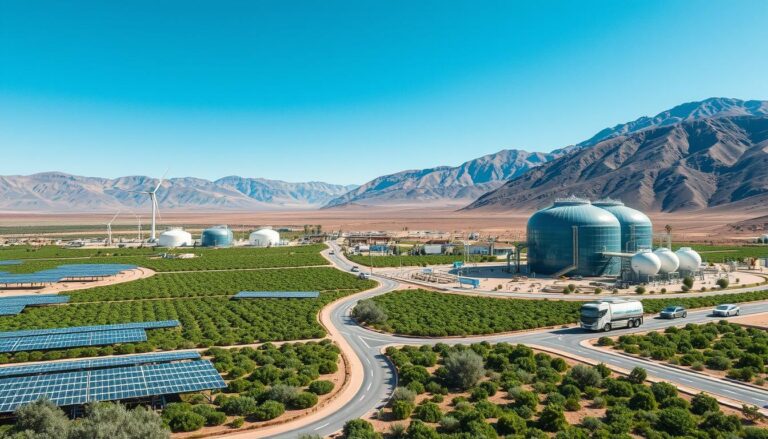How is Morocco rapidly emerging as a technological hub in North Africa, blending centuries-old educational traditions with cutting-edge innovations?
The Moroccan technology landscape is changing fast. Government efforts and growing interest in science and technology are making Morocco a leader. The focus on science and technology in Morocco is clear through reforms aimed at boosting research and development (R&D).
Most researchers in Morocco work at universities. They play a big role in growing the tech sector. Since the early 1990s, education has improved a lot. Places like the University of Al-Karaouine, the world’s oldest university, are key to this change.
Domestic companies are also investing more in R&D. In 2009, this investment jumped from US$620,000 to US$8.5 million. This shows that science and technology in Morocco is on the right path.
The government and private sector are committed to Morocco’s tech growth. But what are these efforts? And how are they making a difference on the ground?
Overview of the Moroccan Technology Landscape
The digital transformation in Morocco has been shaped by strong policies. These include royal decrees, reports, and five-year plans. They aim to boost Morocco’s tech growth. Education plays a big role in this change, as shown in tech updates.
Despite big investments in education, progress is slow. The “decade of education” and the National Charter have improved literacy and education rates. These steps have laid a strong base for Morocco’s tech future.
The Moroccan government has focused on key areas through Five-Year Plans. These plans cover agriculture, telecommunications, and energy. This shows Morocco’s smart way of growing its tech scene.
The digital transformation in Morocco shows steady growth in tech areas. For example:
- Smart Cities Redefined: Morocco is making cities smarter with new infrastructure and green energy.
- Fintech Revolution: Moroccan startups are leading in fintech, like digital payments and blockchain.
- AI and Automation in Industry: AI and automation are making industries more efficient and productive.
- Startups Shaping Tomorrow: Moroccan startups are using tech to solve local and global problems.
- Cybersecurity and Digital Resilience: Morocco is focusing on cybersecurity to protect its digital world.
- Connectivity and 5G Development: Morocco is improving 5G, making high-speed internet better for all.
The digital transformation in Morocco comes from smart plans and teamwork. The government, schools, and tech startups are all working together. Updates on the tech scene show how far they’ve come and what’s next.
Government Initiatives Driving Tech Innovation
The Moroccan government is leading the way in tech advancement. They have set up various initiatives to boost Morocco’s tech scene. These efforts include smart policies and big investments in research and development (R&D).
National Charter for Education and Training
The National Charter for Education and Training is a key part of Morocco’s plan. It focuses on making education tech-savvy. This ensures students are ready for a world driven by technology.
It also aims to connect schools with the real world. This helps new ideas move from the classroom to the market.
Five-Year Plans and Sector Priorities
Morocco’s tech growth is also driven by Five-Year Plans. These plans highlight key sectors for growth and set budgets. For example, from 2012 to 2017, €40 million was spent on clean energy research.
By 2023, this investment will double to €80 million. This shows Morocco’s dedication to green technology.
National Fund for R&D
The National Fund for Scientific Research and Technological Development is a big step forward. It’s funded by the telecom sector and aims to boost research at home. It supports projects in universities, research centers, and industries.
It focuses on renewable energy like solar, wind, and hydropower. By combining policies, funding, and sector goals, Morocco is making strides in tech innovation. It’s becoming a key player in the global tech scene.
Key Technology Startups in Morocco
Morocco’s tech startup scene is diverse and growing fast. These startups have seen a lot of growth thanks to more investments and a supportive environment.
Success Stories and Case Studies
The fintech sector in Morocco is especially exciting. CIH BANK has changed mobile banking with new services. Inwi Money offers easy mobile payments for transfers and bills.
PayIt is known for safe and easy digital wallet payments. HPS Worldwide, based in Morocco, makes payment systems used in over 90 countries.
YallaXash helps with remittances, offering good rates and low fees. Wafacash, a part of Attijariwafa Bank, handles money transfers and payments. M2T improves electronic payment systems, including mobile payments.
Emerging Sectors and Industries
But fintech isn’t the only area seeing growth. Digital advancements are also making waves in other fields. For example, WeCasablanca works on smart city projects in Casablanca, improving urban life with digital services.
The impact of these startups is clear. By 2023, startup investments jumped by 93%. The Moroccan Digital Fund has invested $25 million in 26 startups since 2010. The Founders 212 program has also given $12 million to various startups.
- Morocco signed 17 financial agreements last year, with the number increasing annually.
- In terms of global rank, Morocco holds the 34th position in the Global Startup Ecosystem Report (GSER).
- Casablanca ranks third in North Africa in the Startup Ecosystem Index.
Morocco plans to grow its startup numbers by 20% by 2024. This will take the number of startups beyond 1,500. The goal is to increase revenues by $200 million and employee numbers by 20%.
With a strong fintech base and growing smart tech and e-commerce sectors, Morocco’s startups are leading the way. They are driving a digital economy, attracting more investments and encouraging innovation.
Impact of Technopolis Projects
The growth of Technopolis projects has been a big step for Morocco’s tech scene. These projects aim to boost tech innovation, start-ups, and jobs. Rabat and Oujda’s Technopolis projects are key to this effort.
Technopolis Rabat
Technopolis Rabat is a major tech hub in Morocco. It’s located in a strategic area and has many tech facilities, schools, and start-ups. By early 2014, it had 30,000 workers and 76 companies, helping the local economy a lot.
The government hopes it will add Dh5bn (€544m) to the GDP by 2015. This shows its important role in innovation.
Technopolis Oujda
Technopolis Oujda is in the east of Morocco, covering 107 hectares. It started with an investment of €500m. It aims to boost tech like Rabat did.
It will help start-ups and big companies, making the area more vibrant.
Job Creation and Economic Benefits
Technopolis projects have created many high-quality jobs. For example, Casanearshore Park in Casablanca has 20,000 workers. Rabat’s Technopolis has 30,000.
These jobs help the local economy and keep skilled workers in Morocco. The outsourcing sector also adds to export earnings, even if it’s not always steady.
Morocco wants to be a tech leader in Africa, like Rwanda, Kenya, and Nigeria. The mix of government plans and private money is key to Morocco’s tech future. It promises a future full of innovation and growth.
Morocco’s Global Innovation Index Performance
Morocco has made a big leap in the Global Innovation Index (GII). It now ranks 66th globally with a score of 28.8 out of 100. This shows how much it has grown in tech over the last ten years. Morocco is now among the top 40 in creative outputs.
Rankings and Regional Comparisons
Morocco shines in some areas of the GII but struggles in others. Let’s take a closer look:
- Knowledge and technology outputs: 70th
- Creative outputs: 37th
- Institutions: 78th
- Human capital and research: 81st
- Infrastructure: 88th
- Market sophistication: 82nd
- Business sophistication: 125th
In the Arab world, Morocco is 4th, just behind the UAE, Saudi Arabia, and Qatar. It moved up from 70th in 2023 to 66th in 2024.
Strengths and Weaknesses
Morocco invests a lot in education, ranking in the top 30. This helps grow talent for North Africa tech developments. It does well in innovation results, ranking 47th, but uses resources less effectively, ranking 89th.
But, Morocco falls behind in global corporate R&D and business sophistication, ranking 125th. It also struggles with environmental performance and lacks incentives for technology transfer. Improving these areas could help Morocco do better in the GII and play a bigger role in regional tech.
Role of Higher Education in Technological Advancement
Higher education is key to Morocco’s tech growth. It invests heavily in education and research. Moroccan universities have over 500,000 students (A. Miraoui, 2018), with more expected soon.
Leading Universities and Research Institutions
Universities like Mohammed V and Al Akhawayn lead in tech advancements. The Kingdom focuses on building a skilled AI workforce. It also improved teaching with technology since 2009, boosting online learning.
Academic-Industry Collaboration
Working together, schools and businesses drive research and development. Morocco has strong partnerships and focuses on AI. This teamwork helps grow a talent pool for AI innovation.
- Public-private partnerships are key in the Moroccan tech scene.
- The Moroccan Virtual Campus project aims to unite e-learning, improving online education.
- The “E-Maroc” strategy equips universities with ICT, supporting digital growth.
Morocco also values ethical AI, building trust and fostering learning. This approach keeps the tech industry competitive and innovative. It uses AI for business and tackles education challenges in remote areas.
Adoption and Impact of AI Technologies
Morocco is becoming a world leader in AI technology adoption. It has seen big benefits in areas like education. The country’s strong commitment to using advanced tech is clear.
ChatGPT and AI Tools Usage
Morocco is second worldwide in ChatGPT use, showing its forward-thinking in AI. A big 8 out of 10 Moroccans know about ChatGPT, with 38% using it every day. This shows how deeply Moroccans have adopted AI tools.
ChatGPT’s popularity has grown fast. It hit one million users in just five days, beating big names like Spotify and Instagram. This shows how useful ChatGPT is in changing how we find and use information. Also, 60% of users prefer ChatGPT over traditional search engines, showing a big change in how we look for answers.
AI in Education and Other Sectors
AI’s effect on education in Morocco is impressive. Places like the 1337 Information Technology Training Centre in Khouribga are leading the way in AI for learning. Over 60% of people worldwide think AI will be key in education, and Morocco agrees. AI brings personalized learning, better access, and improved results.
AI is also making a mark in other areas in Morocco. Even though AI use is still low among Small and Medium Enterprises (SMEs), there’s a lot of room for growth. As more people learn about AI and tech gets better, SMEs will use AI to work smarter and please customers better.
Challenges Facing the Moroccan Tech Industry
Morocco has made big steps in using new technologies. But, the tech world faces big challenges. One big issue is finding a balance between jobs and automation.
Data security is also a big worry. As new technologies grow, keeping data safe is more important than ever. A data breach can harm both people and businesses a lot.
Creating good laws for new technologies is key. Laws need to keep up with tech changes. They must protect people’s rights and interests.
Morocco has strong points in innovation, like in renewable energy and digital services. Using these strengths well can help solve tech industry problems. For example, Morocco’s renewable energy made up 37 percent of its power in 2023.
Getting rural areas connected to tech is another challenge. Many rural homes are still getting used to digital life. The government has made progress, but more work is needed.
Morocco wants to digitize all government services by 2030. The goal is to create a single system for all public services. This is part of the Maroc Digital 2020-2025 plan.
Overcoming these challenges is vital for Morocco’s tech growth. It’s important to keep the industry competitive and innovative worldwide.
Conclusion
Moroccan technology trends are moving fast towards digital change and more research. The government supports this with plans like Digital Morocco 2020. This has made the tech scene in Morocco grow quickly.
AI and a strong startup scene are key drivers. They help Morocco adapt to new ideas fast. This shows the country’s eagerness to innovate.
Higher education and partnerships with industries are helping a lot. They create a strong talent pool and research base. E-commerce and mobile shopping are also growing, showing Morocco’s digital commitment.
More people are using the internet and mobile devices for business. This opens up new ways for companies to make money. It’s good for the economy.
But, Morocco’s tech scene has some big challenges. It needs to work on data protection and online security. It also needs to keep the innovation spirit alive.
By using its strengths and tackling its weaknesses, Morocco can keep growing in the tech world. It’s on the right path to becoming a big player globally.
Source Links
- Science and technology in Morocco
- Tech Trends in Morocco: The Expo’s Digital Frontier – Jobs Expo Morocco, Marrakech
- Top Trends Shaping the B2B Landscape in Morocco
- Plans and priorities – Mission Innovation
- Morocco: The Next Industrial and Technological Hub 🇲🇦🇪🇺🇺🇸🇬🇧
- Morocco: Africa’s new startup paradise
- Exploring the Top Fintech Companies in Morocco
- The Role of Technology in Transforming the Moroccan B2B Market
- Innovation Policy in Africa: Catching-up or Leapfrogging ahead?
- Private and public initiatives strengthening Morocco’s ICT sector – Africa 2015 – Oxford Business Group
- Morocco leads Maghreb countries in the 2024 Global Innovation Index
- GII 2024: Morocco Ranks 1st in Industrial Design, a Success Due in Part to its Unique Intangible Capital (WIPO Chief)
- AI and education: “Morocco is not the country to miss out”. Interview with Dr Abdelilah Kadili.
- University 4.0: Digital Transformation of Higher Education Evolution and Stakes in Morocco
- Morocco is the second country in the world in the use of ChatGPT
- Morocco Leads Africa in ChatGPT Adoption, Showcasing Rapid Embrace of AI Technology –
- Measuring the readiness of Ecommerce Small and Medium Enterprises (SMEs) to use Artificial Intelligence: Example of Moroccan SMEs
- Morocco’s Long Road Toward Economic Transformation
- Morocco: The Impact of the Digitization of Public Services
- The Future of B2B E-commerce in Morocco: Trends and Opportunities
- New technologies strengthen Morocco’s ICT sector – Africa 2020 – Oxford Business Group
- Examining the Drivers of E-Commerce Adoption by Moroccan Firms: A Multi-Model Analysis

The Editorial Team is a passionate group of Morocco enthusiasts dedicated to sharing the beauty, culture, and wonders of this captivating country. With diverse backgrounds and a deep love for travel, we strive to bring you engaging and informative content that inspires your Moroccan adventures. From uncovering hidden gems and sharing local insights to exploring mouthwatering cuisine and showcasing the vibrant lifestyle, our team is committed to providing you with valuable resources and exciting stories that enhance your exploration of Morocco. Join us on this journey as we celebrate the rich heritage and unforgettable experiences that make Morocco truly special.

